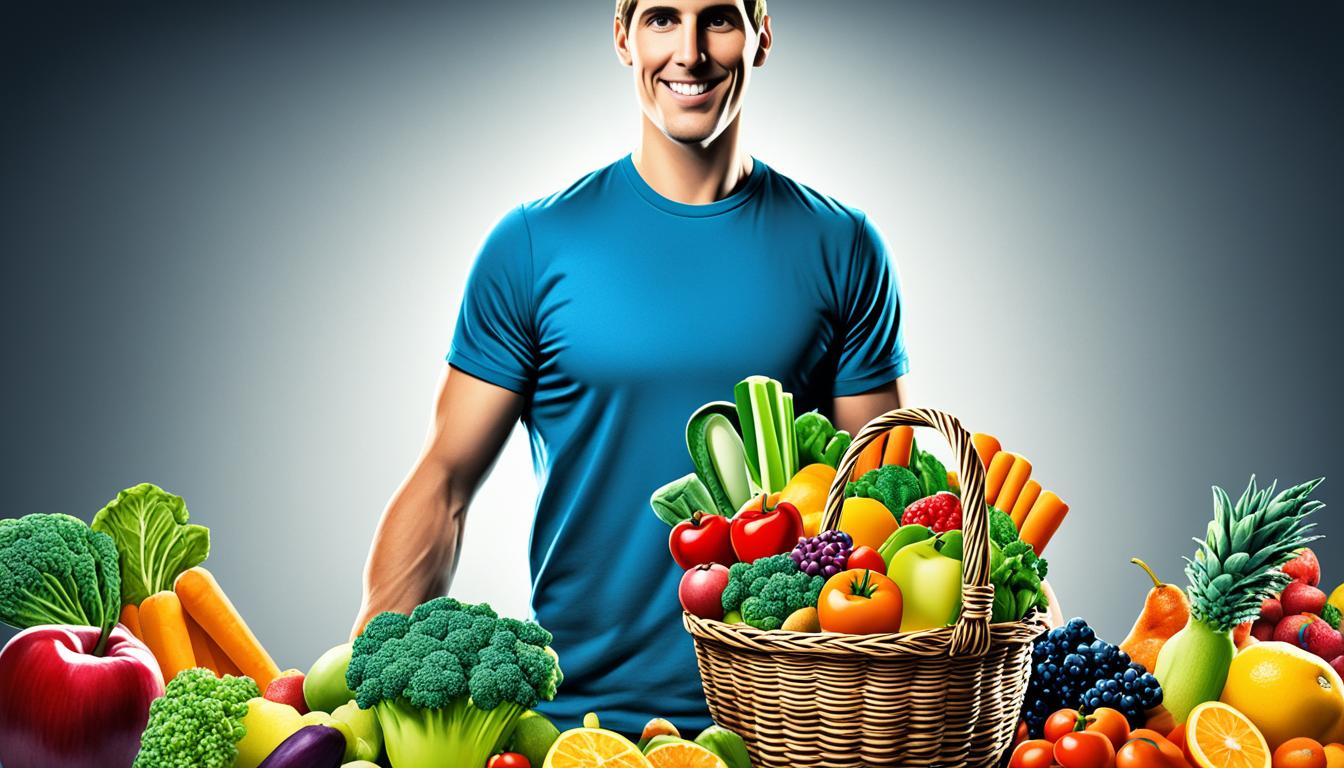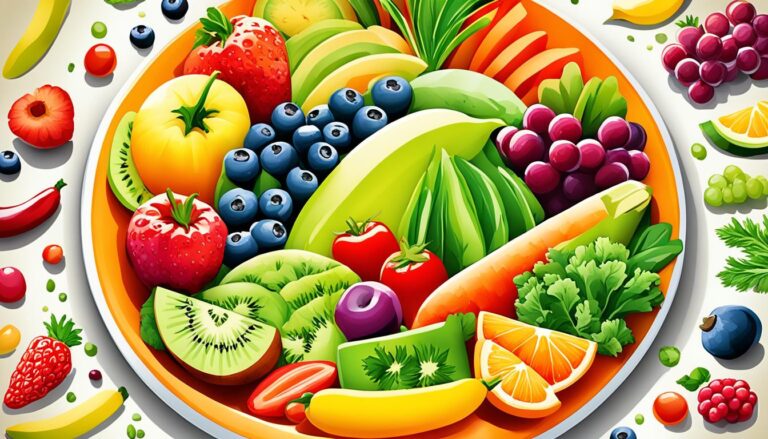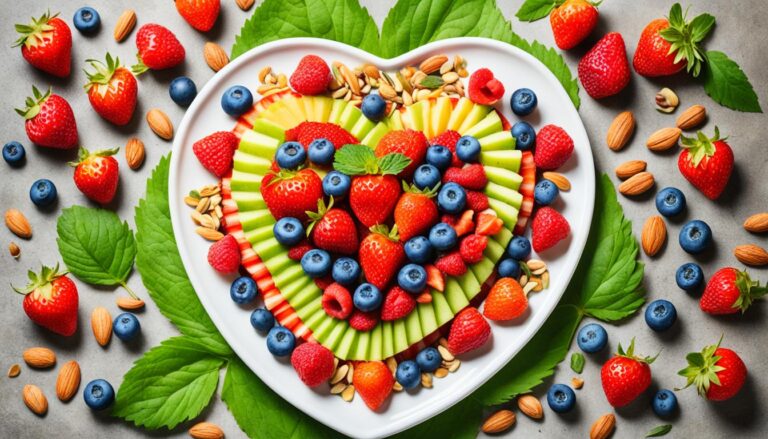Did you know that poor nutrition, along with factors like being overweight, not exercising, and alcohol consumption, can contribute to about 1 in 5 cancers in the U.S.? Nutrition plays a crucial role in overall health and can have a direct impact on the risk of developing cancer. Maintaining a healthy diet is key to reducing this risk and living a healthier life.
Key Takeaways:
- Poor nutrition contributes to about 1 in 5 cancers in the U.S.
- Eating a healthy diet is essential for reducing the risk of cancer.
- Specific foods and their impact on cancer risk are still being studied.
- It’s important to maintain a balanced diet and follow personalized recommendations.
- Lifestyle choices, including diet, are just one aspect of cancer prevention.
Sugar and Cancer: Separating Fact from Fiction
When it comes to the relationship between sugar and cancer, separating fact from fiction is essential for understanding the role of diet in cancer treatment and prevention. While it is true that cancer cells rely on sugar as a source of energy, cutting sugar from your diet alone does not stop cancer cells from spreading.
However, research suggests that certain diets, such as a low-carb, high-fat ketogenic diet, may have potential benefits for cancer patients. The ketogenic diet restricts carbohydrate intake, which in turn limits the availability of sugar for cancer cells to utilize. This dietary approach has shown promise in slowing the growth of certain tumors when combined with standard cancer treatments like radiation and chemotherapy.
It’s important to note that the ketogenic diet is not applicable to general cancer risk reduction and should be tailored to the specific tumor biology. Cancer treatments are highly individualized, and what works for one person may not work for another. A healthcare professional specializing in oncology can provide guidance on the appropriate diet and treatment plan for each patient’s unique situation.
Debunking the Myth: Sugar Feeds Cancer
“The myth that sugar directly feeds cancer cells is not entirely accurate. While cancer cells do rely on glucose for energy, they also have the ability to adapt and use other sources of fuel. Cutting sugar from your diet alone is not enough to stop cancer growth.” – Dr. Lisa Thompson, Oncology Specialist
By adopting a well-balanced diet that focuses on whole foods and minimizes processed and sugary foods, individuals can support their overall health and potentially reduce their risk of developing cancer. It’s important to incorporate a variety of nutrient-dense foods, including fruits, vegetables, lean proteins, and whole grains. This approach promotes overall well-being, supports the immune system, and helps maintain a healthy weight.
It’s also crucial to remember that cancer treatments and prevention strategies should be discussed and guided by healthcare professionals. While a low-carb diet may show promise in certain cases, it is not a one-size-fits-all solution. Personalized care and a comprehensive approach that takes into account individual needs and medical history are crucial for optimal outcomes.
In the next section, we will explore the potential risks and concerns associated with overcooked and burnt foods, shedding light on the truth behind claims of carcinogenic effects.
Overcooked and Burnt Foods: Are They Really Carcinogenic?
When it comes to cooking certain foods at high temperatures, such as bread or potatoes, there is a concern about the formation of carcinogens. One such chemical is acrylamide, which is created during the browning process. Acrylamide has been shown to cause tumors in rodents when consumed in high levels. However, human studies have failed to establish a clear link between acrylamide in food and an increased risk of cancer.
In addition to acrylamide, certain cooking methods of meat can release substances called heterocyclic amines and polycyclic aromatic hydrocarbons. These compounds have been associated with tumor development in rodents. However, the results from human studies have been inconsistent, and a direct correlation between the consumption of these compounds and cancer risk has not been definitively established.
While it is important to be mindful of the potential risks associated with overcooked and burnt foods, including acrylamide, heterocyclic amines, and polycyclic aromatic hydrocarbons, it’s essential to consider the overall context of a person’s diet and lifestyle. The available evidence suggests that the occasional consumption of these compounds through normal cooking methods is unlikely to significantly contribute to cancer risk.
| Cooking Method | Carcinogenic Compounds | Associated Risk |
|---|---|---|
| High-temperature cooking of carbohydrates | Acrylamide | Inconclusive evidence in humans |
| High-temperature cooking of meat | Heterocyclic amines and polycyclic aromatic hydrocarbons | Inconsistent results in human studies |
It is important to note that focusing solely on avoiding overcooking or burning foods may not be the most effective strategy for reducing cancer risk. Consuming a balanced diet rich in fruits, vegetables, whole grains, and lean proteins, while minimizing the consumption of processed meats and highly processed foods, is key. Additionally, incorporating other lifestyle factors such as maintaining a healthy weight and engaging in regular physical activity can further contribute to overall well-being and lower the risk of cancer.
Processed Meats: A Strong Link to Cancer Risk
When it comes to cancer-causing substances, processed meats take the spotlight. The International Agency for Research on Cancer (IARC) classifies processed meats, such as sausages and cold cuts, as Group 1 carcinogens. This classification means that processed meats are considered to have a strong link to cancer risk and are classified as cancer-causing substances.
The evidence linking processed meats to colorectal cancer is particularly strong. Studies have shown that consuming processed meats regularly can increase the risk of developing colorectal cancer. Red meat, on the other hand, has been categorized as a probable carcinogen, meaning it is likely to cause cancer. However, the evidence linking red meat to cancer risk is not as clear as it is for processed meats.
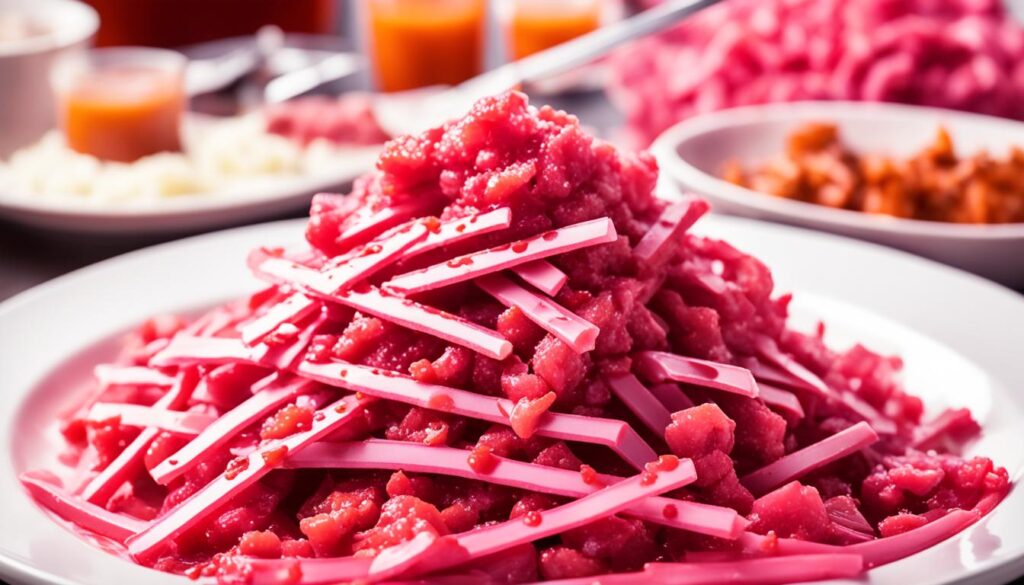
But why are processed meats and red meat considered risky in terms of cancer? It is believed that certain compounds formed during the processing and cooking of these meats contribute to their cancer-causing properties. For example, the high heat used in processing and cooking can lead to the formation of harmful substances such as heterocyclic amines and polycyclic aromatic hydrocarbons.
Studies have shown that consuming processed meats regularly can increase the risk of developing colorectal cancer.
Ultra-processed foods, which often contain processed meats and are high in added sugar, salt, and saturated fat, have also come under scrutiny in relation to cancer risk. These foods undergo extensive processing and contain little to no whole food ingredients. Some studies suggest that regularly consuming ultra-processed foods may increase the risk of developing cancer.
The Impact of Processed Meats on Cancer Risk
To further understand the connection between processed meats and cancer risk, let’s take a closer look at the evidence:
| Evidence on Processed Meats and Cancer Risk | Conclusion |
|---|---|
| Multiple studies have found a significant association between processed meat consumption and an increased risk of colorectal cancer. | The evidence linking processed meats to colorectal cancer is strong. |
| Some studies have also suggested a possible link between processed meat consumption and increased risks of pancreatic and stomach cancers. | Further research is needed to confirm the association between processed meats and other types of cancer. |
| The processing and cooking of meats can lead to the formation of harmful compounds, such as heterocyclic amines and polycyclic aromatic hydrocarbons, which are known to increase cancer risk in animal studies. | Consuming processed meats may introduce these harmful compounds into the body, potentially increasing the risk of cancer. |
While the evidence is strong, it’s important to note that the occasional consumption of processed meats is unlikely to have a significant impact on cancer risk. However, for individuals looking to minimize their risk, it is advisable to limit the consumption of processed meats and opt for healthier protein alternatives, such as lean meats, fish, poultry, or plant-based proteins.
It’s crucial to maintain a balanced diet that includes a variety of nutrient-dense foods and to prioritize whole, unprocessed options whenever possible. The key is to focus on overall dietary patterns rather than singling out specific foods or ingredients.
By making informed choices and practicing moderation, you can take proactive steps towards reducing your risk of cancer and promoting overall health.
The Role of Diet in Cancer Prevention
When it comes to reducing the risk of cancer, maintaining a healthy diet is crucial. While no single superfood can prevent the disease, a diet rich in plant-based foods like vegetables, fruits, and whole grains has been shown to be effective.
Plant-based foods are packed with essential nutrients, antioxidants, and fiber that support overall health and help to reduce cancer risk. The antioxidants found in colorful fruits and vegetables help to protect cells from damage caused by harmful molecules called free radicals.
Whole grains, such as brown rice and whole wheat bread, provide complex carbohydrates that release energy slowly, keeping you full and satisfied for longer periods. They are also rich in fiber, which aids in digestion and helps to maintain a healthy weight.
Incorporating personalized recommendations into your diet is important, as nutrition is complex and depends on various factors. Your overall diet, metabolic health, physical activity levels, and genetic predisposition all play a role in determining the optimal diet for cancer prevention. Consulting with a registered dietitian or healthcare professional can help you develop a personalized plan based on your unique biology and cancer type.
It’s worth noting that while diet is an important factor in cancer prevention, it is just one aspect of a healthy lifestyle. Even individuals who follow a healthy diet and have a physically active lifestyle can still develop cancer. Regular screenings and medical advice are crucial for early detection and treatment.
Remember, prevention is better than cure, and adopting a balanced diet that includes plenty of plant-based foods is a step in the right direction.
Cancer Causing Foods: Avoiding Carcinogens
Some foods contain carcinogenic chemicals that can increase the risk of cancer. Examples include nitrites and nitrates used in processed meats, preservatives like butylated hydroxyanisole, and chemicals created by smoking or grilling meat at high temperatures.
When it comes to processed meats, such as sausages and bacon, certain additives like nitrites and nitrates are used to enhance flavor and preserve freshness. However, these compounds can react with proteins in the meat, forming cancer-causing compounds called n-nitroso compounds (NOCs). Studies have shown that high consumption of processed meats is associated with an increased risk of colorectal cancer. Therefore, it is advisable to limit the intake of processed meats in your diet.
In addition to processed meats, certain food preservatives like butylated hydroxyanisole (BHA) have also been identified as potential carcinogens. BHA is commonly used to prevent spoilage and extend the shelf life of various foods, including potato chips, breakfast cereals, and baked goods. While studies on the direct link between BHA and cancer are still inconclusive, it is wise to minimize your exposure to this preservative by opting for fresh, whole foods instead of heavily processed snacks.
Furthermore, cooking methods can also contribute to the formation of cancer-causing compounds. Grilling and smoking meat at high temperatures can lead to the generation of polycyclic aromatic hydrocarbons (PAHs) and heterocyclic amines (HCAs), which have been associated with an increased risk of cancer. PAHs are formed when fat drips onto hot coals or surfaces, creating smoke that envelops the food. HCAs, on the other hand, are produced when meat is exposed to high temperatures, especially during grilling or pan-frying.
To minimize your exposure to these carcinogens, follow these guidelines:
- Choose organic meats whenever possible, as they are typically not treated with synthetic pesticides or chemicals.
- Marinate meat before grilling, as this can help reduce the formation of HCAs.
- Trim excess fat from meat before cooking to minimize the production of PAHs.
- Precook meat in the oven or microwave before grilling to reduce cooking time and limit the formation of HCAs.
- Consider alternative cooking methods, such as baking, stewing, or steaming, which generate fewer carcinogenic compounds.
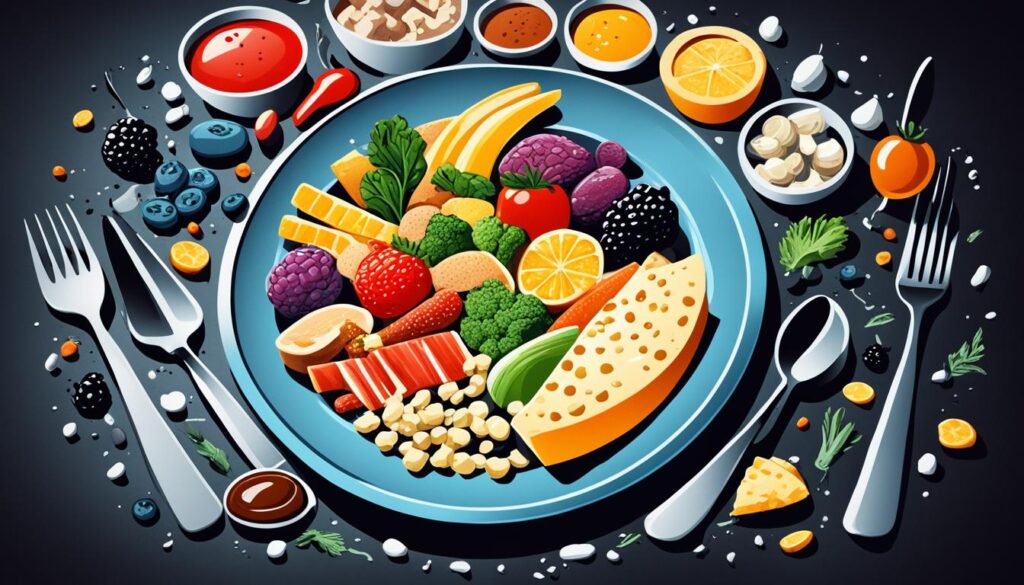
| Carcinogenic Compounds | Foods Containing the Compounds |
|---|---|
| Nitrites and nitrates | Processed meats (bacon, sausages, ham) |
| Butylated hydroxyanisole (BHA) | Processed snacks (potato chips, baked goods) |
| Polycyclic aromatic hydrocarbons (PAHs) | Grilled meats, smoked foods |
| Heterocyclic amines (HCAs) | Grilled, pan-fried, or broiled meats |
The Link Between Alcohol, Sugar, and Cancer
When it comes to cancer risk, both alcohol and sugar consumption play significant roles. Alcohol is classified as a Group 1 carcinogen, meaning it is known to cause cancer. Various types of cancer, such as throat, esophageal, breast, liver, colon, and rectal cancer, have been linked to alcohol consumption. It’s important to be aware of the potential risks associated with alcohol and make informed choices regarding its consumption.
Similarly, excessive sugar intake can contribute to an increased risk of certain cancers. Consuming sugary drinks, including non-diet soda, can lead to weight gain and obesity. In turn, obesity is a risk factor for developing type 2 diabetes, which is associated with a higher risk of cancer. By reducing alcohol and sugary drink consumption, you can help lower your overall cancer risk.

Conclusion
A balanced and nutritious diet is essential for maintaining overall health and reducing the risk of cancer. While certain foods have been linked to an increased cancer risk, there is no magical food or specific diet that can completely prevent the disease. To promote cancer prevention, it is crucial to incorporate a variety of fresh fruits, vegetables, whole grains, and lean proteins into your diet. At the same time, it’s important to limit the consumption of processed meats, red meats, sugary drinks, and highly processed foods.
Remember, maintaining a healthy weight is key to reducing cancer risk, so making wise food choices and portion control is essential. Personalized recommendations based on individual factors such as age, genetics, and overall health should also be taken into consideration. In addition to a healthy diet, regular screenings and seeking medical advice are fundamental for early detection and effective treatment.
By embracing a healthy eating plan and prioritizing regular check-ups, you are taking important steps towards living your best life and reducing the risk of cancer. Remember, your diet is just one piece of the puzzle when it comes to cancer prevention, but every positive change you make contributes to a healthier future. Take charge of your well-being and empower yourself through healthy choices.
Here are two more articles you may enjoy: Unleash the Incredible Benefits of Regular Exercise on Your Life and Top Foods to Boost Your Immune System Naturally.

